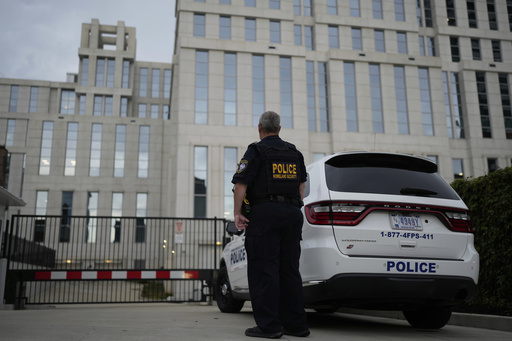WASHINGTON – Kilmar Abrego Garcia, previously deported to El Salvador amid a controversial backdrop of the Trump administration’s rigorous immigration policies, has been returned to the United States to face serious criminal allegations. Authorities claim he was deeply involved in a significant human smuggling network, facilitating the illicit entry of individuals into the country.
His unexpected release from El Salvador concludes one aspect of a prolonged dispute between Trump administration officials and the judicial system. The deportation had been deemed an error, but despite court orders, officials hesitated in rectifying the situation, sparking ongoing legal and political tension.
U.S. officials, armed with an arrest warrant, managed to secure his extradition from El Salvador, where President Nayib Bukele was presented with federal charges from Tennessee. These charges allege Abrego Garcia’s involvement in an immigrant smuggling operation for monetary gain. If convicted in this case, he will be sent back to El Salvador after serving any sentence.
“This is representative of American justice,” stated Attorney General Pam Bondi during the announcement of Abrego Garcia’s return and the unsealing of a grand jury indictment against him. However, Abrego Garcia’s legal team has fiercely denied the charges, with his attorney, Simon Sandoval-Moshenberg, describing them as “unfounded” and claiming that a jury will reject the idea that Abrego Garcia, a simple sheet metal worker, masterminded a high-level MS-13 smuggling operation.
In a Nashville, Tennessee courtroom, Federal Magistrate Judge Barbara Holmes ruled that Abrego Garcia will remain in custody until his arraignment and detention hearing scheduled for next Friday. Appearing in court in attire reflecting a casual setting, he acknowledged his understanding of the charges against him in both Spanish and English.
Democratic lawmakers and immigrant advocates had lobbied vigorously for his release, including efforts made by Sen. Chris Van Hollen of Maryland, who had personally visited Abrego Garcia in El Salvador. Earlier, a federal judge had ordered his return, with the Supreme Court rejecting emergency appeals to delay it.
Despite Abrego Garcia’s return for prosecution purposes, his lawyers expressed dismay, notably because his deportation had previously been blocked by an immigration court due to fears of gang persecution in El Salvador.
The unfolding of this case has had significant fallout, leading to the resignation of a senior official from the U.S. attorney’s office in Nashville. Though Ben Schrader, who served as chief of the criminal division, refrained from detailing his reasons, his social media portrayal hints at an internal struggle regarding prosecutorial integrity.
Sandoval-Moshenberg criticized the administration’s continued pursuit of the case, accusing them of crafting “outrageous” charges instead of acknowledging deportation errors. He also highlighted the emotional strain on Abrego Garcia’s family, urging for some normalcy upon his return to the U.S.
The indictment, which only became public nearly three months after his erroneous deportation, narrates incidents dating back to 2016. While detailing extensive smuggling claims, it also associates him with heinous acts such as the abuse of women transported and corroborates a murder allegation in the context of a gang vendetta, though this charge was not included in the indictment.
His arrest originated from a 2022 incident when the Tennessee Highway Patrol suspected him of human trafficking after finding undocumented individuals in his vehicle. Although he was not charged then, the incident added to the compilation of accusations against him.
Abrego Garcia’s background has been at the center of a heated debate. Immigrant rights advocates argue that his story exemplifies the previous administration’s flawed deportation practices. Yet the Trump administration portrayed him as an undesired figure fitting their deportation criteria.
Having resided in the U.S. for approximately 14 years, Abrego Garcia’s life involved marriage and caregiving for his children with disabilities. His deportation was preceded by 2019 accusations from Maryland police labeling him as an MS-13 affiliate, despite the absence of formal charges.
Although convicted under the recent charges, the Trump administration would still need to revisit immigration court procedures regarding his deportation. The Maryland case likewise remains pertinent, evaluating the administration’s compliance with judicial directives to return him.
Abrego Garcia’s case surfaced simultaneously with the administration’s belated adherence to court orders in another deportation matter, involving a Guatemalan man’s return after being wrongfully sent to Mexico.



